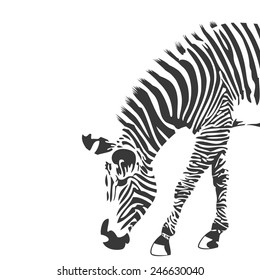
Free Printable Stencils Stencil Animal Print Zebra Tiger Giraffe Cow Honeycomb. 3' hibiscus stencil flower tropical paint plant flowers craft template art new.
Dec 6, 2018 at 10:21AM Asset-tracking specialist Zebra Technologies () is growing by leaps and bounds. The stock has gained 56% over the past year and more than doubled in two years, driven by a steady stream of. In the recently reported third quarter, for example, Zebra grew its earnings 54% year over year on 12% stronger top-line sales. Both figures were well ahead of Wall Street's expectations, and the stock jumped 6% higher that day. And the stock is still trading at just 15 times forward earnings, leaving plenty of room for further gains. So when Zebra's CEO, Anders Gustafsson, found some time for a quick phone conversation, I had to know more about his company's secret sauce. Here are three important nuggets from that call.

Image source: Zebra Technologies. Momentum at a tough time How was Zebra able to beat estimates and raise guidance when at the end of 2018? 'For us, the biggest thing is probably that the secular drivers to each of our vertical markets have some big reasons for why they want to invest in our type of technology,' Gustafsson said. 'So if you're in retail, the whole brick-and-mortar omnichannel for retailers wants to invest in building capabilities, to be able to compete against e-commerce. I think they feel a certain level of urgency around that, and they don't want to kind of be overly tactical in how they go about this.
But they wanted to ramp up the investments that they want, to make sure they see this through.' Gustafsson presented similar scenarios in the healthcare and transportation sectors, where every company needs to keep up with a rapidly changing industry and winning business advantages are hard to come. That's where Zebra's asset-tracking and asset-management systems come in.
What's so special about Zebra? The company may be best known for its bar-code printing and scanning technologies, along with a large portfolio of mobile computing tools for enterprise environments. All of that is true, but Gustafsson argues that the real secret to Zebra's success lies in the services it can provide to longtime customers. 'We have people who work alongside nurses and the salespeople in the store, delivery drivers and so forth, and look at not just how they use our equipment but also how they perform their work flows,' he said. 'We look at how we can help them do their jobs better through both the device but also by re-engineering work flows and being able to leverage the data that we have access to.' If that sounds a lot like Accenture () or the consulting arm of IBM (), you're on the right track.
That's the kind of value Zebra can add to its clients' business processes, beyond the direct impact of its printed labels, electronic RFID tags, and data management systems. And even there, Gustafsson claims to wield some unique advantages. 'Most of the companies you think about are probably more like data-center companies. They crunch through a lot of data and provide some insights for that, but it's batch analytics -- it's not real time,' he said. 'Well, what we do tends to be that we have an advantage in that we have a lot of devices sitting at the edge of our customers' operations. So they have access to data about what's actually happening today at the edge of their operations.
And by having that data and by knowing their work flows, we can say, 'If this is happening right now at this place in your work flows, the next thing you should do is this.' ' So Zebra's mobile units and scanning devices naturally place the company at the front lines of each customer's operations, practically begging the company to provide real-time analytics that can drive actionable insights on the fly. That approach comes less naturally to the IBMs and Accentures of the world. Economies of scale The company's active exposure to raw business data becomes an effective business advantage thanks to Zebra's market-leading position in several different markets. The company faces off against a plethora of challengers in each one of its core market sectors but takes home the market-share crowns anyhow. 'If you go through each of our product categories, in mobile computing we have almost 50% market share, and No. 2 is about 15%,' Gustafsson said.
'On the printing side, we have low 40% market share and the nearest competitor 12%, I think. Otdel kadrov plus 2010 kayak plans. That's a different one than the competitor in mobile computing.